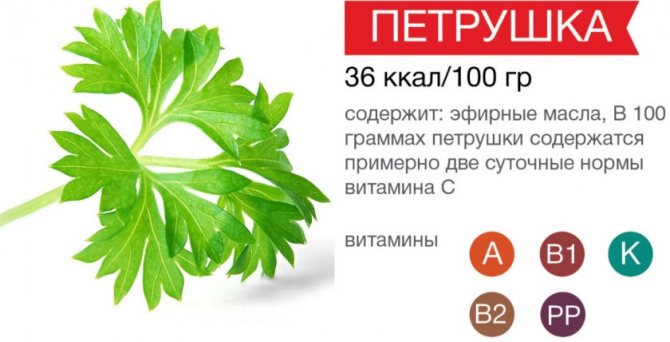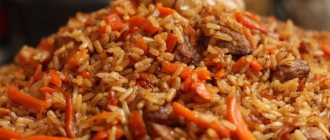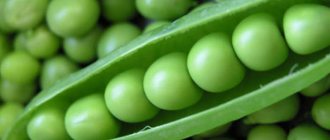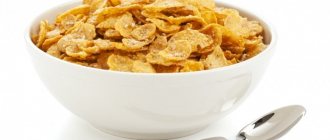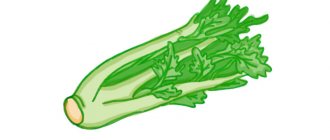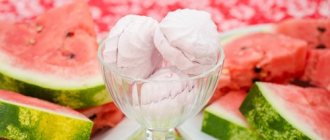Greens contain a huge number of components that are necessary for nursing mothers. With their help, it is possible to quickly and effectively recover after childbirth and properly establish the lactation process. In this case, the baby will be guaranteed to have proper growth and development. Additionally, it should be noted that you should not overuse greens, because not all varieties will be beneficial for babies. There are quite a lot of plants that lead to a negative allergic reaction and cause severe digestive disorders. In this case, the baby begins to suffer from excessive gas formation and colic. Mommy is advised to carefully approach the selection process, because only in this case will the greens be useful.
Parsley is almost completely safe when breastfeeding. It can be included in various dishes along with dill, basil and salad. This type of greenery has a number of benefits and has a positive effect on the body of mother and child.
How to eat herbs, greens and onions during lactation?
The concept of “green” is quite general. Each variety of herbs used in cooking has its own beneficial properties and aroma. They have different effects on the taste and production of milk, which determines the appetite of the newborn and his readiness to breastfeed. The following rules will help to diversify the diet of a new mother with parsley, onions, mint, celery and other herbs:
- in the first postpartum months, herbs are subject to heat treatment, which will help avoid problems with the baby’s tummy,
- first you should add parsley and dill to the menu, then onions, cilantro, basil and other favorite herbs,
- after the third month, it is recommended to season salads and broths with fresh herbs, starting with a small amount,
- if allergies, colic, or gas formation occur in an infant, the consumption of fresh herbs is postponed for a couple of weeks,
- You should not introduce several varieties of greens into your diet at the same time; the break between new products is at least 3-4 days,
- Herbal infusions can cause allergies in infants, so it is important to use them only after consultation with a doctor.
In what form is it possible?
Parsley can be added to many dishes. Therefore, depending on the method of preparing the dish, a nursing mother can eat it boiled, stewed or baked. There are restrictions on eating fresh parsley. In the form of decoctions and tinctures, these greens can be used to increase lactation and treat certain diseases.
Fresh
It is recommended to introduce fresh parsley into the diet of a nursing woman when the infant is three months old. By this time, the baby’s gastrointestinal tract will have formed and the risk of negative reactions will become minimal.
In the soup
Add parsley to the soup as a seasoning and eat it one hour before feeding your baby. This will bring benefits and variety to the diet of a nursing woman. Experts also recommend this method of consuming parsley to increase the amount of milk in a nursing mother.
Decoction
A decoction of parsley allows blood vessels to expand and also remove toxins and negative toxic substances from the body. It is used for the prevention and treatment of various diseases of the female reproductive system.
Many women after childbirth are faced with such a painful phenomenon as cystitis. Parsley and a decoction of it have pronounced anti-inflammatory properties. And since nursing women cannot take antibiotics and other medications, decoctions of this herb can be a good help in eliminating the disease.
A decoction of parsley leaves for cystitis.
Compound:
- warm water - 1l;
- chopped parsley - 10 tbsp. spoons
Preparation:
- Pour warm water over the greens and place on low heat.
- After boiling, cook the product for another 10 minutes.
- Turn off the heat and let the broth brew for 40 minutes.
- Strain the broth through cheesecloth.
Application: Take 1/2 cup 15 minutes before meals 3-4 times a day for 3-4 days.
Result: The decoction relieves pain, kills pathogenic microflora, reduces inflammation and strengthens the immune system.
Eating parsley during lactation
Aromatic parsley belongs to a group of herbs that can increase breast milk production. You can try the low-calorie seasoning about a month after delivery. Its composition, rich in vitamins K, B1, B2, folic acid, microelements potassium and magnesium, is useful for the fragile body of mother and baby.
In terms of vitamin A content, parsley herb is equivalent to carrots, but does not contain carotene, which can cause allergies in infants. It also surpasses many types of greens in the amount of vitamin C, and therefore strengthens the immune system, resists pathogenic bacteria and viruses, and helps with colds.
Among the positive qualities of parsley (in any format - fresh, dried, stewed, boiled):
- stabilization of the liver, kidneys,
- improvement of lactation,
- strengthening gums,
- regulation of hormonal levels,
- improvement of blood clotting,
- helps in the absorption of calcium,
- removal of toxins,
- preventing and relieving swelling.
Parsley for mother's beauty and health
Parsley infusion is one of the helpers for a lack of breast milk. To prepare it, add 2 tbsp. l. chopped fresh herbs with boiling water and leave for 30 minutes. Drink in small sips throughout the day. A similar infusion of parsley herb restores freshness to the skin. You can freeze it and wipe your face as needed. The skin will thank you with a gentle blush, even tone, and absence of swelling.
Recipes with parsley for nursing mothers
Apple and parsley sauce
This sauce is suitable for all types of meat. It will help to usefully diversify the diet of a nursing mother after the baby is three months old, since garlic can cause allergies.
Compound:
- Apple - 1 piece;
- garlic - 3-4 small cloves;
- olive oil - 2 tbsp. spoons;
- water - 2 tbsp. spoons;
- salt - ½ teaspoon;
- parsley - 50 gr.
Preparation:
- Peel and seed the apple.
- Cut the apple into slices.
- Place the apple slices and garlic cloves in a blender.
- Add olive oil, water and salt.
- Stir until a homogeneous consistency is obtained.
- Add parsley to the sauce and mix everything again.
Dill during lactation
Dill during breastfeeding is a popular component of tea to improve lactation, and doctors recommend dill water during colic in a baby (more details in the article: How should a nursing mother drink dill water correctly?). Equally useful for mother and baby, it is approved for use in the first postpartum month. The optimal time to include herbs in the menu is 7-14 days of a baby’s life. The norm for a nursing mother is no more than 50 grams of dill per day. The health benefits of the herb are great:
- help with colds,
- strengthening the immune system,
- increased milk production,
- normalization of high blood pressure,
- reduction of mental stress,
- normalization of digestion and sleep,
- dilation of blood vessels, prevention of heart disease.
During colic in a newborn, it is not always possible to purchase dill water at the pharmacy. You can make it yourself, which requires a teaspoon of crushed dill seeds. They are poured with a glass of boiling water, infused and filtered after an hour. A newborn should be given a teaspoon of warm dill water before or after feeding three times a day. It is not addictive and helps in the fight against colic. Contraindications to the use of dill are allergies, urolithiasis, low blood pressure.
Dill tea to improve lactation
If necessary, tea made from dill seeds will help a new mother to increase the production of breast milk. Making it is as easy as making water, the only difference is in the proportions. You need to take a tablespoon of dill seeds, pour a glass of boiling water over them and leave for 1 hour. Take the strained infusion several sips throughout the day.
A herbal cocktail is also suitable to improve lactation. You should grind a tablespoon of fennel seeds, dill, and aromatic anise. Brew a tablespoon of the mixture with a glass of boiling water, leave for 30 minutes, strain, drink in small sips half an hour before feeding the baby.
Parsley for a nursing mother: benefits and recipes
Greens should definitely be included in the diet when breastfeeding, because they contain a lot of vitamins and minerals.
Nutrients are necessary for the speedy recovery of the mother after childbirth, for the establishment of lactation and for the full development of the baby. However, not all types of greens are safe for babies.
Many herbs can cause allergies and even poisoning, disrupt digestion and increase colic. Therefore, you should carefully select foods for your diet while breastfeeding.
For a nursing mother, the safest types of greens are dill, basil, lettuce and parsley. Let's look at the beneficial properties and rules for using parsley while breastfeeding.
Beneficial features
Parsley contains many useful substances, including folic acid, vitamins K, B1 and B2, magnesium and iron, potassium and other important elements. Interestingly, parsley is superior in vitamin C content to other types of greens, and is equivalent to carrots in vitamin A content. Such greens are useful for both mother and baby, and for lactation.
Parsley performs the following beneficial functions in the body:
- Increases immunity, resists the development of infections and the effects of harmful bacteria;
- Improves kidney and liver function;
- Normalizes blood clotting;
- Maintains the required level of hemoglobin in the blood;
- Improves the absorption of calcium in the bodies of mother and child;
- Calms and relieves irritability, stabilizes the functioning of nerve cells;
- Strengthens bones and gums, whitens teeth;
- Improves the condition of hair and nails, tones the skin;
- Increases lactation;
- Stops inflammatory processes and helps with cystitis;
- Regulates material metabolism and cleanses the body;
- Improves appetite and digestion;
- Normalizes the menstrual cycle and restores hormonal levels.
Parsley is included in the list of products that increase lactation. A more detailed list can be found here. It is also important that parsley is a low-calorie product. It contains only 36 kcal per 100 grams. Therefore, you can eat greens without the risk of weight gain.
Even the healthiest and safest foods during breastfeeding can be consumed with caution, since any food can harm the baby, especially in the first two to three months of life. The fact is that the child’s digestion and body are just adapting to new conditions. Therefore, he can react negatively to irritants, including foods.
You can try parsley for the first time 3-5 weeks after birth. Eat a small portion, preferably cooked. Observe your baby’s reaction for two days; it is during this time that food allergies manifest themselves.
If a rash, redness, swelling and other negative consequences appear, immediately remove parsley from your diet. How to determine and what to do if a baby has a food allergy, see the link https://vskormi.
ru/problems-with-baby/pischevaya-allerguya-u-grudnichka/.
If the baby’s health has not worsened, you can continue to eat parsley. But don't overeat! The daily intake of greens during breastfeeding is 50 grams. Before using, carefully select and wash parsley. Greens should be fresh without yellow or withered leaves.
We invite you to read: Parsley for the winter - preparations: 4 ways to preserve greens
At first, it is better to eat parsley in heat treatment, since in this form it is easier to absorb and digest. Greens can be added to soup, baked or stewed with vegetables, meat and fish. Pediatricians do not recommend consuming fresh greens earlier than three months after the baby is born.
Uses of parsley
Parsley can be used for more than just cooking. Greens are effectively used in cosmetology, medicinal purposes and to increase lactation. If a nursing mother has problems producing breast milk, a special infusion will help.
Parsley is very beneficial for the skin. It improves complexion, gives a healthy appearance and helps get rid of pigmentation. To do this, you can freeze the parsley infusion and wipe your face with ice cubes every morning.
Green gruel will relieve swelling and make the skin fresh. To whiten the skin, eliminate acne and pigments, use a tonic. To do this, pour two teaspoons of chopped fresh herbs with a glass of boiling water and leave for 15-20 minutes.
Parsley infusions perfectly heal wounds, relieve irritation and help with insect bites. In addition, greens will help you lose weight and get rid of excess fluid and swelling.
Green sauce
It is known that most types of sauces, mayonnaise and ketchup are not allowed when breastfeeding. Then you can use butter and herbs for cooking. Combine the butter, finely chopped parsley and dill, and salt in a bowl and stir thoroughly.
Pancakes
- Flour – 1 glass;
- Chicken eggs – 3 pieces;
- Parsley - a large bunch.
Finely chop the parsley. Break the eggs into the greens and add flour. Mix the mixture thoroughly, add salt and pepper. Bake the pancakes in heated vegetable oil until golden brown on both sides.
Stewed meat and potatoes
- Beef – 300 grams;
- Potatoes – 7 medium tubers;
- Cumin seeds – 2 teaspoons;
- Vegetable oil – 1 tablespoon;
- Dill and parsley, salt and pepper to taste.
Cut the beef into cubes and place in heated vegetable oil. It is better to use a frying pan with thick walls and a bottom or a cauldron. Fry the pieces of meat until half cooked. Cut the potatoes into medium cubes and add to the meat.
Fry the ingredients for two to three minutes, add cumin, add water and simmer until tender. Readiness is determined by checking the potatoes using a fork. If the pieces break easily, the dish is ready.
Greens can be added 3-4 minutes before readiness, or use fresh ones.
Pie with cheese and herbs
- Flour – 170 grams;
- Milk – 150 ml;
- Butter – 75 grams;
- Grated hard cheese – 50 grams;
- Chicken eggs – 2 pieces;
- A bunch of parsley and green onions.
Mix flour and butter, add salt and pour in a little cold water. Place the dough in the refrigerator for half an hour. Boil and chop the eggs, finely chop the parsley and onion. Mix grated cheese, herbs and eggs, add milk.
We suggest you read: When can you plant dill and parsley?
data-matched-content-rows-num=”9, 3″ data-matched-content-columns-num=”1, 2″ data-matched-content-ui-type=”image_stacked”
Beneficial features
We are all accustomed to the fact that fresh greens are included in most dishes; soups are prepared with them, added to main courses and used for salads. However, not every plant is suitable for a nursing mother, especially in the first months after childbirth.
For example, sage and mint are considered natural remedies for reducing breast milk production. In addition, they are quite strong allergens, and therefore it is better to avoid consuming them earlier than six months after childbirth.
Dill, parsley, celery, green onions and lettuce, on the contrary, promote better lactation and bring many benefits to both the young mother and the baby. The beneficial properties of these plants are so extensive that it is worth talking about each of them separately.
The benefits of dill
- One of the most important beneficial properties of dill is its beneficial effect on the digestive system. Drinking dill water helps fight constipation, normalizes intestinal function and speeds up metabolism.
- Dill contains a significant amount of B vitamins. These compounds take part in many processes occurring in our body, and therefore the need for them during breastfeeding is especially high.
- All the same B vitamins affect the rate of development of the baby’s nervous system and have a strengthening effect on it.
- Dill contains a large amount of vitamin C. This substance is a strong antioxidant and also helps strengthen the immune system. For this reason, dill should definitely be included in the diet during outbreaks of infectious diseases.
- Dill has a significant anti-inflammatory effect, due to which it is used in medicine. When eating this plant, this effect extends to the entire body as a whole.
- Dill seeds, thanks to a set of certain beneficial substances, naturally increase the production of breast milk. That is why dill is almost always included in special teas for lactation.
Benefits of parsley
- Parsley is a real storehouse of all kinds of microelements. It contains calcium, phosphorus, iron, magnesium, manganese, potassium, zinc, copper and so on. All of them are necessary for a young mother for recovery, and for the baby for active growth.
- Like dill, parsley has anti-inflammatory properties. Eating it helps to deal with problems in the oral cavity, various internal inflammations and skin injuries.
- Parsley also helps improve the condition of bones and joints. Its regular use, due to the presence of calcium, leads to strengthening of bone tissue. Since the baby grows especially rapidly after birth, its need for calcium is especially great.
- Many mothers face problems removing fluid from the body during breastfeeding. Lack of potassium leads to the formation of edema and water retention in the body. Parsley removes all excess and normalizes the water-salt balance.
- Along with dill, parsley can also help strengthen the immune system, which will be important in the winter season.
We suggest you read: Cilantro and coriander are the same thing
Benefits of celery
- The main beneficial property of celery for a nursing mother is its ability to help lose weight. This plant has a negative calorie content, and therefore eating dishes with celery leads to an increase in energy consumption by the body.
- Celery also helps normalize digestive function, and does this extremely gently. This property makes the plant extremely useful for those mothers who suffer from increased gas formation and flatulence.
- Celery contains substances that have antibacterial properties. This feature allows you to use greens as a remedy for all kinds of infections.
- Celery, like parsley, has a pronounced diuretic effect. The removal of excess fluid from the body leads to a decrease in blood pressure, which means the load on the cardiovascular system is reduced. After childbirth, a woman’s body is significantly exhausted, and therefore it simply needs such support.
- Some of the beneficial substances from celery, which have an anti-inflammatory effect, are excreted through the kidneys. Thanks to this, regular consumption of celery is a kind of prevention of urinary tract diseases.
- Of course, almost all greens have a beneficial effect on the immune system of mother and baby, but the undisputed leader in this regard is green onions. It is this plant that contains a significant amount of plant substances necessary to maintain strong immunity.
- Some of the compounds contained in green onions have a beneficial effect on the health of the cardiovascular system. They lower blood pressure and make the walls of blood vessels more elastic.
- Many women notice negative changes related to vision and eye health after childbirth. Onion greens contain vitamin A, which helps not only maintain good vision, but also promotes its restoration.
- Bone strength depends not only on the amount of calcium in the body, but also on the presence of vitamin K in the proper amount. Green onions contain a very large amount of this compound, and therefore this green is an excellent tool for strengthening bone tissue.
- One of the most significant beneficial properties of lettuce for a child and mother is associated with its beneficial effect on the nervous system. This plant contains substances that protect brain neurons from damage and ensure their better functioning.
- Just like green onions, lettuce has a positive effect on bone health and strengthening.
- Lettuce contains a minimal amount of calories, and therefore it can help nursing mothers lose extra pounds.
- Salad promotes better digestion due to the presence of plant fiber in it. Fiber improves intestinal function and normalizes metabolic processes in it.
Beneficial features
Leafy green salad for a nursing mother
Appetizing green salad leaves are a fresh, low-calorie product, especially useful in the autumn-winter period. They are easily digestible, have a positive effect on the functions of the gastrointestinal tract, and rarely provoke allergies. You can introduce them to the mother’s menu a month after the birth of the child. The salad consists of 90% water, so you don’t need to drink it down (there is a risk of stomach upset). The beneficial effects of salad are expressed in the following:
- normalization of sleep,
- regulation of metabolism,
- preservation of vision,
- improvement of the condition of skin, nails, hair,
- strengthening bones,
- improvement of brain activity,
- stress relief,
- burst of energy.
It’s good to grow lettuce on your windowsill, but if you have to buy it, you should pay attention to the freshness of the leaves. It is equally important to find one reliable seller and purchase lush bunches from him.
While washing, the leaves should be carefully inspected to remove all dirt, dry spots, and snails that may be encountered. Contraindications for use include problems with the bladder and kidneys. INTERESTING: how to quickly lose weight while breastfeeding?
Green onions: can you eat them fresh?
Green onions are a storehouse of vitamins and microelements that help resist viruses, colds, and overcome overwork and blues. When consumed in moderation, it will not affect the taste of milk, but will restore the strength of a mother whose body is exhausted after pregnancy. Onions contain easily digestible carbohydrates, organic acids, calcium, vitamins C, P, E.
Onion feathers replace expensive vitamin supplements, so you should not refuse to use them. The only wish is moderation (a few pods in a salad or separately), since excessive consumption threatens the baby with vomiting.
The benefits of onions are considerable:
- prevention of vitamin deficiency,
- reducing the risk of blood clots, cancer,
- normalization of blood pressure,
- removal of metal salts and toxins,
- strengthening gums and teeth,
- stabilization of the gastrointestinal tract,
- lowering cholesterol and blood glucose levels.
Contraindications to eating green onions
Along with the beneficial properties, there are a number of contraindications to consuming green onions. It should be eaten with caution if you have liver, kidney, or hypertension diseases. For chronic ailments of the gastrointestinal tract (ulcers, gastritis), green onions are replaced with another herb, or consumed in small quantities with the permission of a doctor.
You should try dishes with onions in the first half of the day so that you have time to monitor the baby’s reaction. If the mother ate it during pregnancy, the baby should not have problems. When he shows concern, further use of green feathers should be abandoned.
Cilantro for a nursing mother
Spicy green coriander (cilantro) is often used for salads, seasoning for meat, and rich soups. It contains folic acid, minerals, vitamins B, C, P, and essential oils. Not everyone loves cilantro, but if a nursing mother is one of the fans of this herb, then it is recommended to include it in the diet after parsley, dill, and lettuce have been introduced. The recommended amount is up to 35 grams per day.
Cilantro, like other greens, should be introduced gradually. Its benefits for mother and baby are great:
- strengthening bones, tooth enamel, bleeding gums,
- relieving physical and mental stress,
- stimulation of the kidneys, digestive system,
- protection against pathogenic bacteria,
- removal of cholesterol from the body.
Contraindications for consuming cilantro are diabetes mellitus, a tendency to allergies, individual intolerance, thrombosis, ischemia, recovery after a stroke, heart attack. Babies under one and a half years of age do not need to add cilantro to ready-made dishes or give it on their own.
Celery when feeding a baby
Celery is a spicy seasoning that gourmets love to add to salads, main courses, and creamy soups. However, it contains components that can negatively affect the condition of a nursing mother and baby. It is recommended to try it 3 months after birth, monitoring the baby’s digestion. Initially, it should be cooked stewed or boiled, adding to gravy, meat or broth. The roots and leaves can be tasted raw only in the 6th month of lactation.
The daily intake of celery for a nursing mother is 5 grams, the weekly intake is up to 15. There is an opinion that a cocktail made from it enhances lactation, but excessive consumption of this type of greenery can lead to digestive upset in a baby. You need to eat celery, but in moderation. Then it fully reveals its healing properties:
- strengthening the immune system,
- weight loss after childbirth,
- fight against depression, apathy,
- regulation of the thyroid gland,
- relief from cystitis,
- maintaining the functioning of the heart and kidneys.
Basil for breastfeeding
Basil is often used in cooking sauces and savory meat dishes. The unique composition of the herb is rich in iron, vitamin C, E, A, PP. It also contains a lot of sodium, potassium, zinc, and essential oils, which give it a rich aroma. The calorie content of basil is higher than that of many vegetables. However, it is consumed in small quantities, sometimes combined with other herbs.
A nursing mother is allowed to eat basil every day, but in moderation and only after lactation has been established. Excess grass in the daily diet leads to a decrease in milk production, which is used by women who want to stop breastfeeding. The herb is also contraindicated for diabetes, thrombosis and cardiac disorders. If everything is in order, basil will bring many benefits:
- relieves stress and cramps,
- improves sleep
- reduce colic,
- will increase immunity,
- eliminates sore throat,
- improves mood and appetite.
Soothing basil infusion
A healing decoction made from 15 grams of herb and a glass of boiling water will help you get the maximum benefit from spicy basil. The leaves are poured with water, kept in a water bath for 15 minutes, and infused. Drink 150 ml before bedtime, which will be calm and strong. The prescription should not be abused, but sometimes it will be a good replacement for sedatives.
Features of use during hepatitis B
It is possible to eat greens during breastfeeding, but this must be done carefully, since the risk of a negative reaction is still present. Absolutely any product can have a bad effect on a baby. Particular attention should be paid to his health in the first three months after birth. During this period, the digestive system will be able to undergo the necessary adaptation and function normally. Food is most often the main irritant.

A flavorful addition to any dish
Parsley can be tried in small quantities three weeks after the baby is born. Experts recommend subjecting it to heat treatment. In this case, the likelihood of allergies can be reduced several times. If no negative effects were found within 48 hours, then you can continue using it. Otherwise, parsley is excluded from the diet for another three weeks. If you have allergies, it is recommended to visit a doctor. He will be able to provide the mother with a list of recommendations for further nutrition.
Parsley should only be eaten in moderation. During the day, this norm should be within fifty grams. Remember to wash your greens before adding them to any dish. It should not have yellow spots or limp leaves. Otherwise, the grass has already lost its properties.
At the first stage of introducing parsley into the diet, it must be served in heat treatment. In this case, it can be digested faster and will not harm the baby’s body. Greens go well with main courses, meat, fish and vegetables. The plant can be actively used only after the baby is three months old.
General recommendations for nursing mothers
While the mother is breastfeeding, it is important to keep a food diary. Everything she ate should be written down there, and the baby’s reaction should be noted. If colic, anxiety, vomiting and other symptoms appear, you can immediately determine the product that caused the illness and eliminate its use. Typically, the herbs of parsley, dill and onion do not have a negative effect on the baby’s body, since these plants are hypoallergenic.
When breastfeeding, other herbs, especially mint, should be used with caution (for more details, see the article: Can a nursing mother drink mint tea while breastfeeding?). Its one-time addition to tea will improve lactation, but with regular use the effect may be the opposite. When consuming aromatic herbs and greens while breastfeeding, it is advisable to consult a doctor (see also: what can you eat while breastfeeding a newborn?). Knowing how they act on the body, he will help you choose the most healthy and varied diet.
Beneficial properties of parsley
Giving up this product while breastfeeding is far from the best idea, because a bunch of greens contains many useful substances, thanks to which the female body, weakened by childbirth and feeding, will recover faster.
The inclusion of this variety of greens in the diet of a nursing mother is vital, and all thanks to the beneficial properties that parsley has.
- These include:
- increasing immunity;
- beneficial effect on kidney and liver function;
- stimulation of lactation;
- improving the ability of the mother and child to absorb calcium;
- bringing blood clotting to normal levels;
- calming effect (greens help relieve irritability and normalize the functioning of nerve cells);
- stabilization of hemoglobin levels in the blood;
- normalization of metabolism, removal of toxins from the body;
- beneficial effects on the condition of skin, hair and nails;
- stabilization of the menstrual cycle and restoration of hormonal levels;
- strengthening bones and gums, whitening tooth enamel;
- stimulation of normal digestion, improvement of appetite.
In addition, greens contain vitamins K, B1 and B2, folic acid, magnesium, iron, and potassium. And in terms of ascorbic acid content, this product is the clear leader among all existing types of greens.
